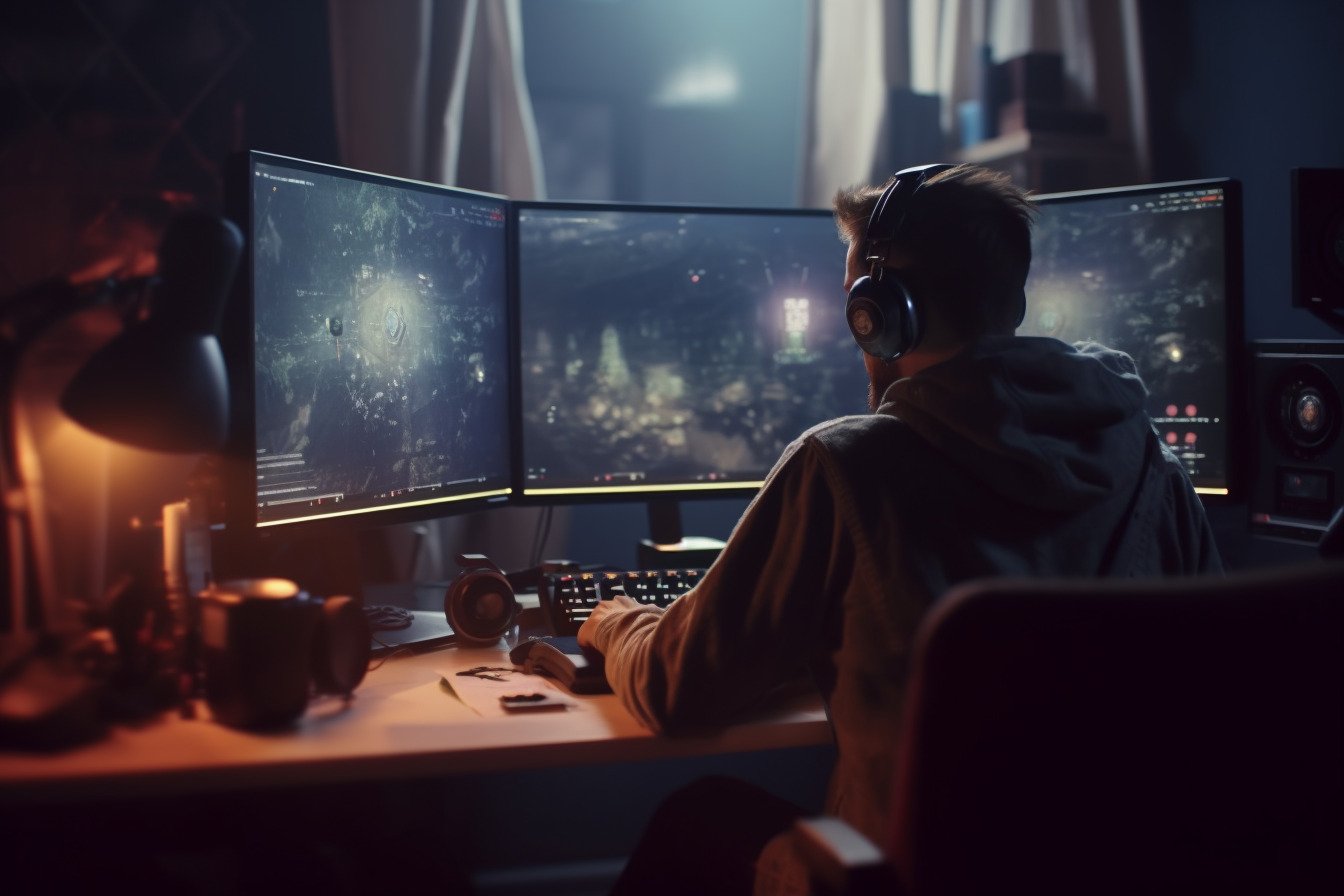Brief Overview of Twitch and Its Impact on Gaming Culture
Twitch is more than just a live-streaming platform; it’s a cultural powerhouse that has redefined the landscape of gaming. Since its inception in 2011, Twitch has rapidly evolved to become a focal point in the gaming community, boasting millions of streamers and viewers who engage in the platform daily.
In the bustling world of Twitch, gamers are no longer merely players, they have become entertainers, influencers, and community leaders. It has changed how games are played, shared, and even developed. From speedrunning marathons to esports tournaments, from cozy casual gaming sessions to innovative uses like social eating and real-life streaming, Twitch’s impact is undeniably profound.
Moreover, it has changed how we consume gaming content. In this arena, viewers can directly interact with their favorite streamers in real-time, a stark contrast to the traditional one-way flow of entertainment mediums. This interactivity builds vibrant communities around games, streamers, and events, fostering a sense of belonging and camaraderie among its users.
Purpose of the Article and What Readers Will Discover
But Twitch is not without controversy. Among these is the platform’s decision to ban certain games from being streamed – a decision that has sparked debates and discussions within the Twitch community and beyond. In this article, we will dive deep into this issue.
We’ll explore the policies that lead to game bans, examine the controversy surrounding these decisions, and take a closer look at some specific games that have been banished from the platform. We will also assess the impact of these bans on streamers and game developers, compare Twitch’s policies with other streaming platforms, and ponder the future of game streaming on Twitch.
Join us as we delve into the fascinating world of banned games on Twitch. Whether you’re a streamer, a game developer, or just a curious reader, there’s plenty to discover. Let’s get started.
Understanding Twitch’s Content Policies
Twitch’s Terms of Service and Community Guidelines: An Overview
Twitch, like many other online platforms, operates under a set of rules and policies designed to foster a safe and respectful community. These guidelines, detailed in the Twitch Terms of Service and Community Guidelines, cover a wide range of behaviors and content, including harassment, hate speech, and copyright infringement.
One critical section of Twitch’s policies pertains to the type of content allowed on the platform, and by extension, the games that can be streamed. Twitch explicitly states that games rated Adults Only (AO) by the Entertainment Software Rating Board (ESRB) are prohibited from being broadcast. Similarly, games that feature explicit sexual content, gratuitous violence, or any form of illegal activity are also typically not allowed.
The Role of These Policies in Determining Banned Games
While the guidelines are relatively clear on the types of content that are off-limits, the implementation can sometimes be a grey area. Twitch reserves the right to restrict content that it deems inappropriate, even if it doesn’t explicitly break any rules. This latitude allows Twitch to react to community feedback, new information or simply changes in societal standards.
Moreover, Twitch’s ban on games is not always permanent. There have been instances where games were initially banned due to content concerns, only to be unbanned after developers made necessary modifications to align with Twitch’s policies.
In the following sections, we will explore some of these banned games, the reasons behind their banishment, and the wider implications of these decisions on the Twitch community and the gaming industry at large.
The Controversy of Game Bans

The Debate Surrounding Twitch’s Decision to Ban Certain Games
The decision by Twitch to ban certain games from its platform has been a subject of ongoing debate. Supporters argue that Twitch, as a private company, has every right to curate its platform’s content. They believe that these decisions are necessary to maintain a safe and inclusive environment for its diverse user base, especially considering the platform’s younger audience.
Critics, on the other hand, see these bans as a form of censorship. They argue that Twitch’s policies can be subjective, inconsistent, and lack transparency, leading to confusion and frustration. For instance, some banned games might include explicit content, yet similar themes could be found in other allowed games. Moreover, game developers, particularly those of smaller indie games, often feel unfairly targeted by these bans, which can significantly impact their reach and success.
Pros and Cons of Game Bans on Twitch
Like any policy, the banning of games on Twitch comes with both benefits and drawbacks. On the pro side, these restrictions help maintain a certain standard of content, making the platform more appealing and safer for a broader audience. It also protects Twitch’s brand image and commercial interests, particularly in terms of attracting advertisers who might shy away from controversial content.
However, there are also downsides to this approach. Banning games can limit creative freedom and diversity in the gaming world. It can also negatively impact game developers, especially smaller or independent ones, whose success often relies heavily on the exposure gained from Twitch streamers. Lastly, inconsistencies in enforcement can lead to accusations of favoritism or bias, potentially eroding trust in the platform.
The debate over game bans on Twitch is complex and multi-faceted. As we delve into specific case studies of banned games in the next section, these controversies will become even clearer.
3DXChat: The Game, the Controversy, and the Ban
3DXChat, self-described as “the most innovative 3D sex game of the year,” is essentially a sex simulator. The game offers explicit virtual sex, character customization, and even includes a beach volleyball component. The controversy around this game mainly stems from its explicit sexual content, which goes against Twitch’s community guidelines. Considering Twitch’s policies and its efforts to maintain a safe and respectful platform, it was no surprise that 3DXChat faced a ban. The explicit nature of the content, its potential to attract an adult audience, and its divergence from the typical gaming experience arguably contributed to Twitch’s decision to prohibit the game from being streamed on their platform.
Artificial Academy 1 & 2: An Analysis of Its Ban
Artificial Academy 1 & 2 are games created by Illusion, the same developer behind Artificial Girl. The games are set in a school environment, and players can play as both male and female characters. It’s essentially a school-themed version of Artificial Girl, a game that also faced a ban on Twitch. The controversy here isn’t as explicit as in the case of 3DXChat, but Twitch’s decision to ban the Artificial Academy series likely stems from its adult themes and potential sexual content. Although the games may not be as explicitly sexual as 3DXChat, they still contain content that Twitch has deemed inappropriate for its platform, resulting in the ban.
Yandere Simulator: Why Twitch Said No
Yandere Simulator is an open-world game centered around a psychopathic high school student. The developer of the game has stated that they are unsure why the game was banned from Twitch. Based on the other games on this list, it’s probably due to the near-nudity, the violence, or some combination of the two. Yandere Simulator is known for its controversial themes, including violence and suggestive content, which have sparked debates within the gaming community. Despite the developer’s uncertainty, it seems clear that these elements likely played a role in Twitch’s decision to ban the game from being streamed.
Second Life: The Virtual World That Got the Axe
Second Life was initially introduced as a virtual world where users could learn, grow, and explore new things. However, over time, it has evolved into a platform largely associated with explicit sexual content, earning it a place on Twitch’s ban list. Despite its original aim to provide a platform for creativity and exploration, the game’s reputation for being a haven for explicit content overshadowed these aspects. The controversy around Second Life largely revolves around its explicit content and how it is used by its players. The ban by Twitch seems to be a response to this controversy, reflecting the platform’s ongoing effort to control the type of content shared on its site.
Impact of Twitch’s Game Bans
Effect on Streamers: Case Studies and Personal Experiences
The impact of Twitch’s game bans on streamers can vary significantly. For some, it can lead to a shift in the content they produce and the communities they build. Bans can also directly affect streamers who have built their platform around a particular game that is later banned. This can result in a significant loss of viewership and income, as well as necessitate a shift in content strategy. Unfortunately, specific case studies or personal experiences of streamers affected by game bans were not readily available during my research. Further investigation might be necessary to gather more detailed and personalized accounts.
Effect on Game Developers: Case Studies and Reactions
Game bans on Twitch can also significantly impact game developers. Twitch’s visibility and reach can directly affect a game’s popularity, and being banned can mean a loss of potential players and income for developers. There are examples of games such as ‘Apex Legends’ that gained a huge player base quickly due to exposure on Twitch, indicating the platform’s potential impact on a game’s success.
On the other hand, Twitch also offers a second life to older games when popular streamers decide to play them, thus giving developers an unexpected boost and extending the lifespan of their games. Twitch’s policies and the visibility of different identities on the platform might also influence how game creators approach diversity and inclusion in their games, suggesting an indirect impact on game development trends.
While the data available provides a general understanding of the impact, more specific case studies regarding developers’ reactions to their games being banned from Twitch were not easily accessible during my research. Further research might be necessary to explore this area in more detail.
Comparing Twitch’s Policies with Other Streaming Platforms
Twitch has a set of guidelines for the content allowed on its platform, which include restrictions on violent, explicit, and sexually suggestive games. The platform also bans games that promote hate speech or drug use. In addition, Twitch reserves the right to ban games that it deems inappropriate or in violation of its terms of service. They take viewers’ safety and moderation very seriously, hence, they are continuously reviewing new game releases and uploaded content. Any game with an Adults Only ESRB rating or that is deemed to be in violation of the website’s community guidelines might lead to a ban or removal. As an example, games like “3DXChat”, “Artificial Academy 1 & 2”, “Yandere Simulator”, and “Second Life” have been banned on Twitch for violating their community guidelines.
Twitch’s policies have a significant impact on the gaming industry. It provides a platform for game developers to get feedback, for games to gain popularity quickly, and even for games that were once popular to get a second life. Twitch has also made strides in discoverability for the LGBTQIA+ community, and has influenced game creators to be aware of the different identities and views of each game, hopefully leading to greater diversity and inclusion.
Twitch vs. YouTube Gaming: A Comparison of Game Ban Policies
As for YouTube Gaming, I found an article discussing recent changes to YouTube’s policies regarding gaming content. The policy changes focus on giving creators greater transparency into how videos are evaluated for demonetization on topics such as inappropriate language and violence. YouTube has provided a specific list for gaming content creators. As a result, many games that depict graphic violence are unlikely to be monetized. For instance, videos will not be eligible for monetization if they include “graphic dead bodies in a non-educational video” or “ultra graphic violent acts (including those involving law enforcement) and injuries.” This policy change is likely to deter creators from playing games that are too questionable, and it could potentially lead game developers to tone down violent content in future games.
Twitch vs. Facebook Gaming: A Comparison of Game Ban Policies
Twitch has a specific policy in place regarding the types of games that can be streamed on its platform. The platform has a list of prohibited games, and streaming any of these games can result in a ban or suspension. In addition to specific game titles, any game that has an Adults Only ESRB rating or violates Twitch’s community guidelines can also lead to a ban. The length of the ban or suspension typically depends on the severity of the infraction and the channel’s past ban history.
Facebook Gaming, on the other hand, appears to have a less strict policy with regards to game content and user behavior. As per a report on charlieintel.com, there have been instances of players streaming live footage of themselves cheating in games like Warzone without any repercussions. This suggests that Facebook Gaming’s community guidelines may not explicitly prohibit players from streaming content that involves cheating. However, it’s important to note that this information is based on a specific case, and Facebook Gaming’s overall policy towards game bans might be more nuanced or vary in other contexts.
The Future of Game Streaming on Twitch
As a leading platform in the game streaming industry, Twitch is expected to continue its growth in the coming years. A key factor driving this growth will likely be the increasing popularity of esports, where Twitch holds a significant advantage due to its deep roots in the gaming community. As esports continues to move into the mainstream, Twitch is well-positioned to capitalize on this trend.
In addition, Twitch’s interactive features, such as chat and donations, help create a unique community experience that differentiates it from traditional forms of media. As audiences increasingly seek interactive and social viewing experiences, these features are likely to become even more important.
However, Twitch will also face challenges in the future. It will need to navigate changes in the gaming industry, deal with competition from other platforms like Facebook Gaming and YouTube Gaming, and manage issues related to content moderation.
Possible Changes to Twitch’s Content Policies
Given the evolving nature of the gaming industry, it is likely that Twitch will need to update its content policies in the future. One area that may see changes is the platform’s game ban policy. As new games are released, some may contain content that violates Twitch’s community guidelines, leading to their addition to the list of banned games.
Additionally, as Twitch continues to grow, it may face increased pressure to deal with issues such as hate speech, harassment, and the use of cheats in games. This could result in stricter enforcement of its existing policies, or the introduction of new policies to better address these problems.
Lastly, as the platform continues to expand beyond gaming into areas like music, art, and talk shows, it may need to develop new guidelines to govern these types of content.
Predictions for Future Banned Games
Predicting specific games that will be banned on Twitch in the future is challenging, as it depends on a variety of factors including the content of the game, changes in societal norms, and updates to Twitch’s content policies. However, it is likely that any games that contain explicit adult content, promote hate speech or violence, or violate other aspects of Twitch’s community guidelines could be at risk of being banned.
In general, Twitch seems to take a proactive approach to banning games that violate its guidelines. This trend is likely to continue in the future, especially as the platform faces increasing scrutiny over the content it allows.
Conclusion
The landscape of game streaming is evolving, with platforms like Twitch and Facebook Gaming playing a major role in shaping this industry. Each platform has distinct policies concerning banned games and content moderation. Twitch enforces a specific list of prohibited games and also bans games with Adults Only ESRB ratings or those in violation of its community guidelines. Facebook Gaming’s policies, however, seem less stringent, and there have been instances of players streaming content involving cheats without facing any repercussions.
Recap of the Key Points Covered in the Article
This article has explored the comparison between Twitch and Facebook Gaming’s game ban policies. While Twitch has a clear list of banned games, Facebook Gaming’s policy appears to be less explicit, especially in the case of cheating in games. Looking ahead, it’s expected that Twitch will continue its growth, driven by factors like the popularity of esports and its unique community experience.
Final Thoughts and Invitation for Reader Comments
The future of game streaming is incredibly exciting, but it’s also filled with challenges and uncertainties. As these platforms continue to grow, it will be interesting to see how their content policies evolve to meet the changing needs of their audiences and the broader gaming industry. What are your thoughts on this matter? Are there any games you think should be added to or removed from Twitch’s banned list? How do you think Facebook Gaming should handle cheating on its platform? We invite you to share your thoughts and join the discussion.










